Migrant workers leave home to build a better life, but too often, their health pays the highest price. From sudden cardiac deaths to being denied treatment because they cannot pay upfront, these stories reveal the painful reality many migrant workers face daily.
CARAM Asia speaks on behalf of migrant workers to highlight these challenges and amplify their voices. As part of the global #HealthCostsHurt campaign, we advocate for Universal Health Coverage and equitable access to healthcare for all migrant workers.
Healthcare is a human right. No one should ever be left behind.
#UHC #UHCDay #HealthForAll #NoOneLeftBehind #MigrantRights #CSEM #UHC2030 #HealthCostsHurt
Migrant Wokers' Perspectives for Inclusive HIV Responses
Rethink.Rebuild.Rise
In solidarity with the global 'Rethink. Rebuild. Rise' movement by AIDS CONFERENCE 2026, CARAM Asia uses this platform to ensure migrant workers’ voices are heard in shaping HIV responses.
This video features real voices from migrant communities, sharing their experiences, hopes, and the urgent need for inclusion, dignity, protection, and equality in HIV policies and programmes.
On World AIDS Day 2025, we rise together to advocate that no one should be left behind.
#RethinkRebuildRise #WorldAIDSDay #LeaveNoOneBehind
Safe & Fair Labour Migration for Women By Community Development Services
CARAM Asia Project Partner in Sri Lanka
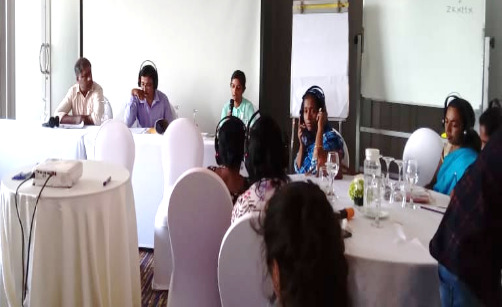
Panel discussion on the return and reintegration research on returnee women migrant workers facilitated by Ms. Januka from CDS
Community Development Services, a member of CARAM Asia in Sri Lanka together with ESCO, CHRCD, WMC and VOM network co-organized a consultation hosted by GAATW from 2nd to 4th August 2023 in Colombo. The consultation was based on the GAATW research on return and reintegration conducted in Sri Lanka. The primary reasons for the consultation was to look at the findings in the light of the post-Covid, political and economic crisis, the challenges and how these challenges are being addressed locally and to learn from migrant development societies what is working and what is not.
From the outcome of GAATW research, the post-Covid challenges faced by women migrant workers in Sri Lanka include high food and commodity inflation, poverty, weak currency, unemployment, no relief given for livelihood, no guidance or direction given for returnee migrants, increase in human trafficking and human smuggling, and women exodus of talent which lead cause of brain drain. This problem arose as a result of Sri Lanka's ongoing economic crisis in 2022. Additionally, this consultation also engaged CSOs working on migrants' rights and members from migrant societies to share their experiences.
At the conclusion of the event, a recommendation paper was submitted to the Ministry of Foreign Employment to promote the rights of Women workers. The recommendations submitted were based on four stages of labour migration; pre-decision and pre-departure, while in employment abroad and right upon return. The Pre-Departure Orientation (PDO) must emphasize on empowering migrant workers to preserve the rights and dignity of all migrant workers, particularly women in low-wage positions. To strengthen the curricula for PDO sessions, government should also actively take returnee migrant women's experiences and concerns into consideration.
While for recruitment, addressing the recruitment irregularities issues such as high payments, contract violations, trafficking, dual contract signing and others should be part of the process. Next, strengthening bilateral agreements and MOUs to focus on labour rights, protection and the promotion of human rights and expanding the mandate of Embassies and Consular Offices in destination countries to include legal and psycho-social support for distressed migrant workers should be taken into consideration while women migrants are in employment abroad. Lastly, right upon return through the return and reintegration programmes, it should address the socio-economic challenges of returnees and their communities.
Migrant Health Camp by SPEAK Trust (Upcoming Program)
CARAM Asia Project Partner in Pakistan
In conjunction with International Migrants Day, SPEAK Trust, one of CARAM Asia member organization in Pakistan is planning to arrange a Migrant Health Camp in its field office located in Swat, Pakistan on 18th December, 2023. The health camp will specifically aim to address specific health needs of migrant population and will provide essential medical services, screenings, referral services and health education to migrants. The target group will be migrants in Pakistan and the main stakeholders involved will be government officials, doctors, general physician and psychologists. The event will be expected to take place from 0900-1700 hrs, local time. Therefore, the event was anticipated to contribute to the CARAM Asia project in terms of increasing number of testing among Migrants for HIV and other sexually transmitted diseases (STDs), raising HIV awareness among them and increase access to quality health services for migrants.
Consultation with Political Representatives and Government officials by POURAKHI (Upcoming Program)
CARAM Asia Project Partner in Nepal
POURAKHI, A CARAM Asia member in Nepal will be conducting a consultation with political representative and Government officials. The purpose of this consultation is to identify and address policy gaps that hinder the rights and support for HIV-positive migrants and their families. Through active engagement with key stakeholders, the event aims to foster reform and initiate meaningful change. Scheduled for October 2023, this event follows a comprehensive review of policies governing foreign employment for Nepali migrant workers. This review will help identify specific areas requiring improvement and adjustment.
The consultation will convene at the national level, bringing together stakeholders from various departments and authorities involved in the welfare of migrant workers and HIV-affected individuals. The consultation will involve a diverse range of participants, including representatives from ward and municipal levels, provincial government bodies, relevant government departments, non-governmental organizations (NGOs), advocacy groups, medical professionals, and experts specializing in HIV and migrant issues.
The primary achievement of this consultation will be the development of a policy gap. This comprehensive document will systematically outline identified shortcomings in the current policies and propose potential interventions to bridge these gaps. Additionally, the consultation will act as a catalyst, spurring reform initiatives at the policy level. These efforts will concentrate on improving support systems for HIV-affected individuals and their families, ultimately fostering a more inclusive and supportive environment
CARAM Asia Pre-Recorded Research Launching Ceremony on the Occasion of Universal Health Coverage Day 2022
CARAM Asia Regional Research on the Road to UHC for All with a Special Focus on Migrant Worker's Health Rights
This research project was supported by Global Health Council
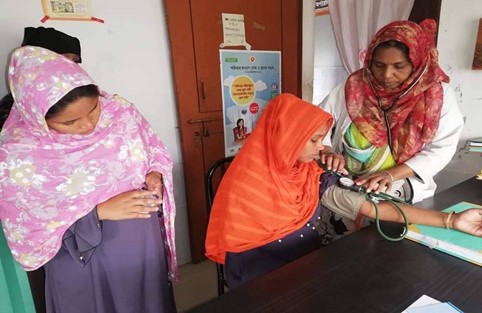
Returnee migrant woman taking health assistance at a local health complex.This health initiative is being implemented under UHC in Bangladesh. Source: Ovibashi Karmi Unnayan Program (OKUP)
For the migrants worker’s community, the urgency to achieve Universal Health Coverage is even more pronounced because less migrants are able to access to quality healthcare and even fewer have health insurance. This reflects that good health always becomes an option for migrant workers. This is because migrants are primarily considered as sources of remittances rather than human beings but in reality, these remittance warriors are playing the most vital role in accelerating the economic growth but they are encountering various adversity and challenges in return.
Evidently, in 2021, Bangladesh has received a total of 3,652 deceased migrant worker’s bodies and major causes of the deaths were because of heart attack, stroke, road accidents and suicide. If migrant workers had access to healthcare in the receiving countries nations where they were working, being received, these causes and related health issues might be prevented or managed on time rather than losing lives. Undocumented migrant workers cannot access health care due to the fear of arrest, detention and deportation as they have to show legal work permit (passports) before getting any medical attention.
While, in Pakistan, there has not been budget allocated for the health needs of Pakistani labour emigrants but funding has been set aside for health needs of registered Afghan refugees. Even worst, migrant workers are among the most vulnerable groups in terms of gaining access to health care, but HIV & AIDS policies in migrant worker's sending nations in South Asia do not prioritise them as at risk critical populations which leads to a significant neglect of their health risks. Because of this, achieving Universal Health Coverage is the only realistic solution to all the adversities faced by migrants in migration cycle at pre-departure, post-arrival and re-integration stages.
At post arrival stage, when migrants are in receiving countries they experience stigma, discrimination and they are being largely criminalized in many countries based on their HIV positive status. Mandatory health testing including tests for HIV is a requirement for migrant workers to obtain job abroad. For example, in Jordan, Residence and Foreign Affairs Law of 1973 has been used to deport many migrants who were living with HIV as part of Jordanian strict policy to deport any non-national who is living with HIV. Majority of governments in receiving countries have strict policies which state that all migrants must undergo a series of medical examinations before coming and upon arrival in the country and migrants have to undergo mandatory medical tests again as a requirement for renewal of work permit. As a result, if they are found with HIV infection and any other health conditions, they immediately get arrested, detained, deported back to their sending countries without any provision of health services.
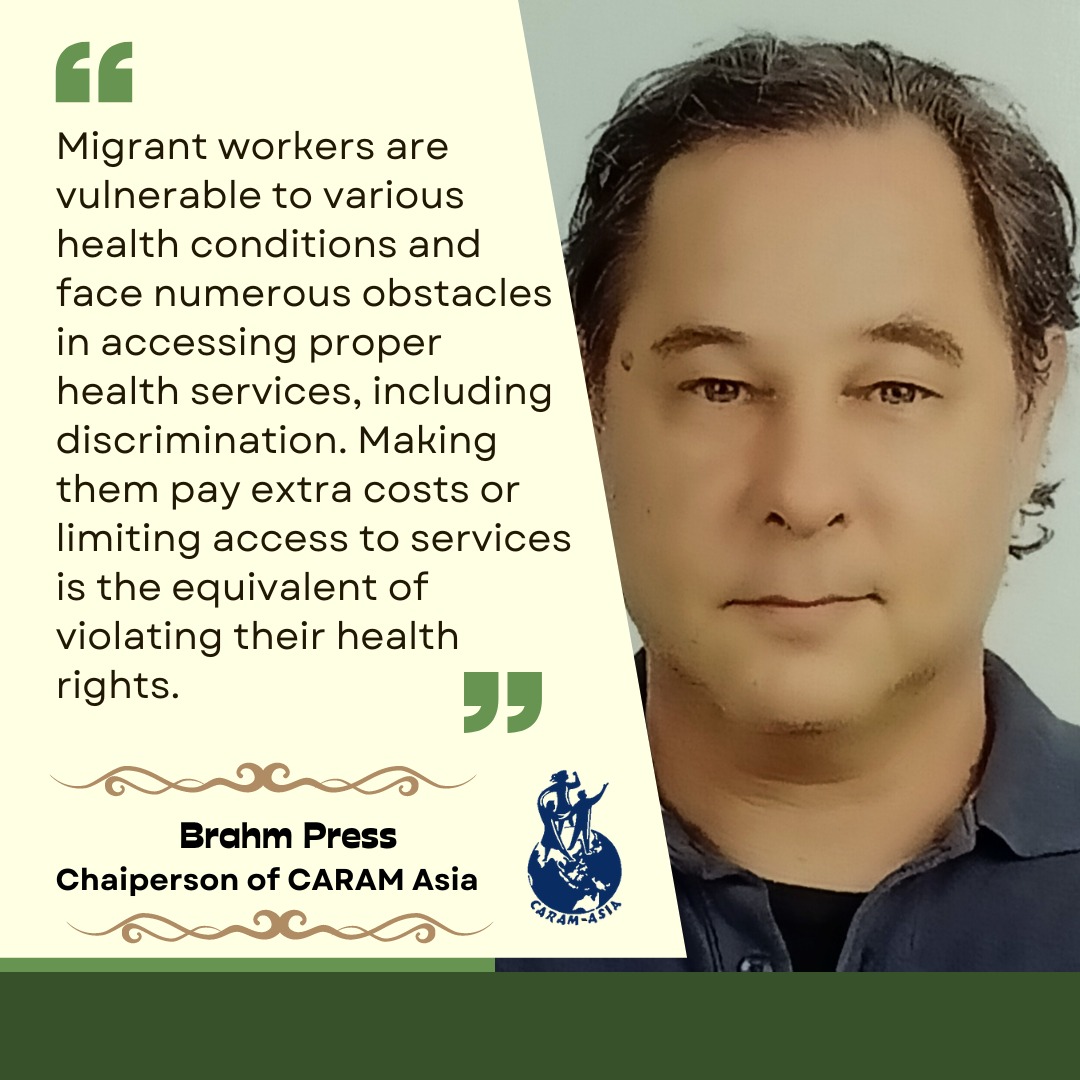


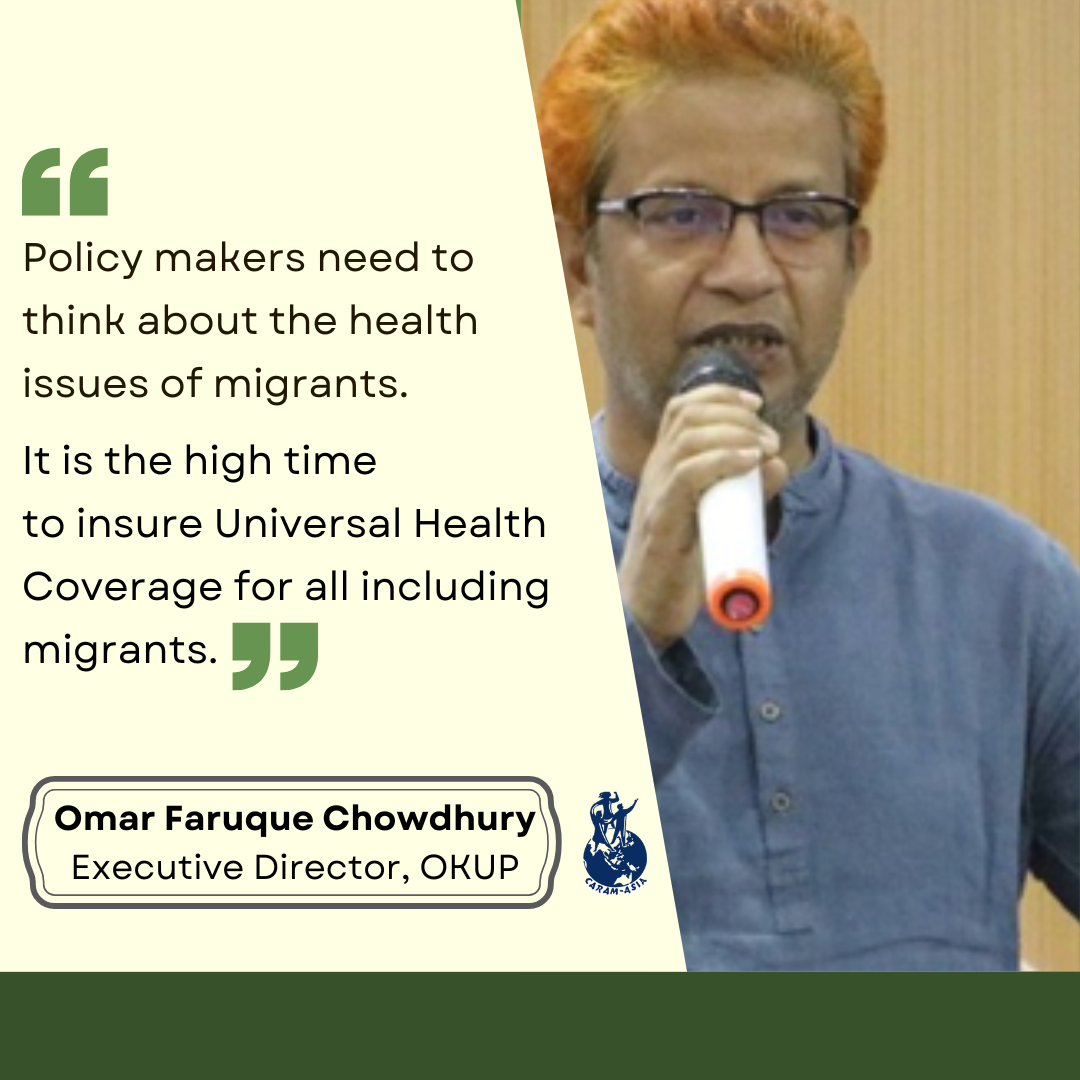
What and Why Universal Health Coverage (UHC)?
According to the World Health Organization (WHO), Universal Health Coverage (UHC) means that "all individuals and communities have access to the health services they need, when and where they need and, without suffering any financial hardship". It includes the full spectrum of essential and quality health services from health promotion to prevention, treatment, rehabilitation and palliative care across the life course. Additionally, UHC is a holistic approach not only directed towards the provision of comprehensive health services but also their funding, management and administration. Hence, robust health financing structures are key to achieve UHC.
World Health Organizations (WHO) uses 16 essential health services in 4 categories as indicators of the level and equity of coverage in countries. The delivery of these services requires adequate and competent health care workers with optimal skills mix at facility, outreach, and community level, and who are equitably distributed, adequately supported, and enjoy decent work. UHC strategies enable everyone to access the services that address the most significant causes of disease and death and ensure that the quality of those services is good enough to improve the health of the people who receive them.
Therefore, UHC is crucial for all because it is a fundamental right to have access to healthcare anywhere in the world without discrimination. It is important to access these services for the health and well being of people irrespective of their status and recognition. Not forgetting, practicing strong UHC in nations promotes a healthy population and a healthy workforce that supports a healthy economy.
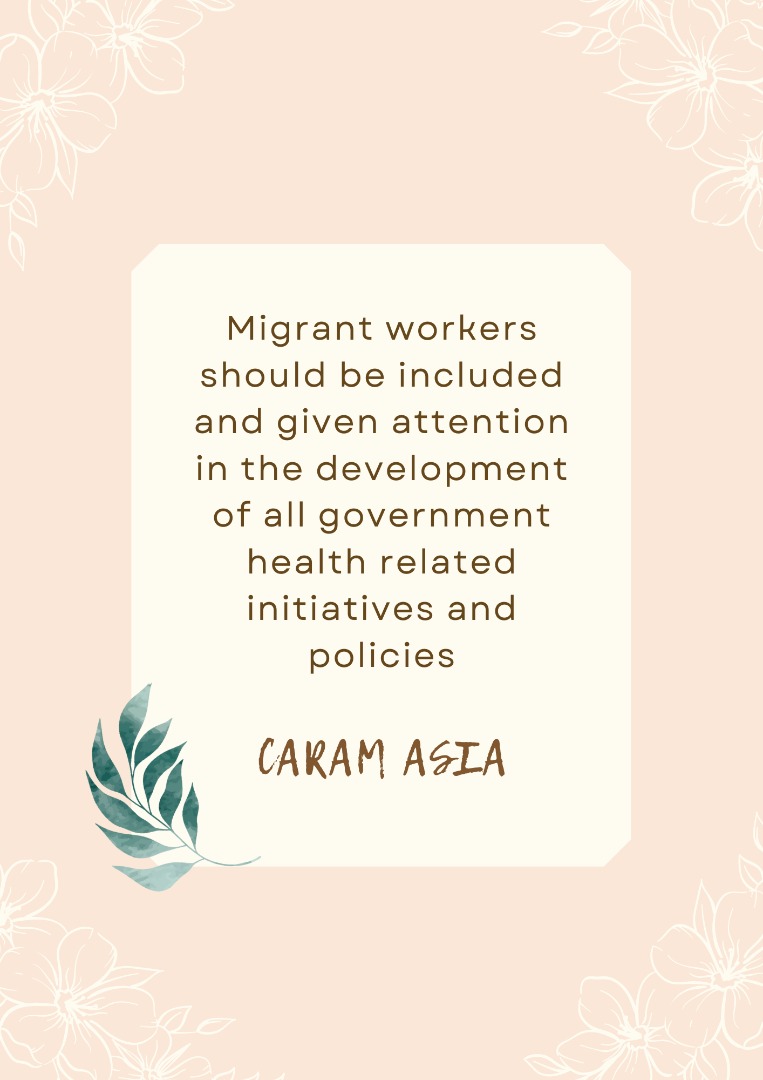
Progress Towards Universal Health Coverage (UHC)
Achieving UHC is one of the targets the nations of the world set when adopting the Sustainable Development Goals in 2015. Countries reaffirmed this commitment at the United Nations General Assembly High Level Meeting on UHC in 2019. Countries that progress towards UHC will make progress towards the other health-related targets, and towards the other goals. Good health allows children to learn and adults to earn, helps people escape from poverty, and provides the basis for long-term economic development.
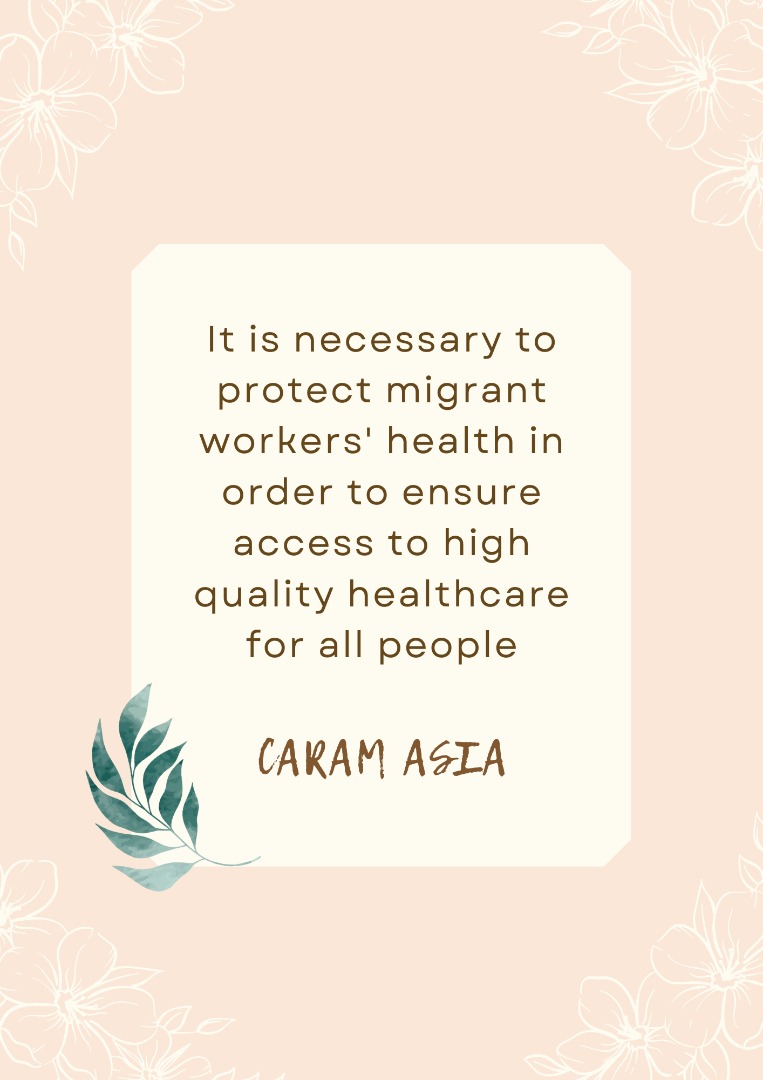
Launch of CARAM Asia Pre-Recorded Research Report on Universal Health Coverage Project
CARAM Asia carried out a Research Project on Universal Health Coverage (UHC) for Migrants in Four South Asian Countries which are Bangladesh, Sri Lanka, Pakistan and Nepal to bring light to the implementation progress of Universal Health Coverage in the respective countries.The research findings are presented by CARAM Asia partners in the videos given below: